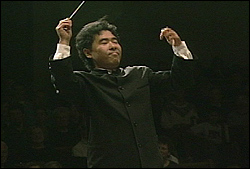The Spring 2000 dot-com collapse and 9/11 affected both audience commitment and corporate giving and have made the following years challenging for classical ensembles. The Bellevue Philharmonic is bucking the trend. Expanding its audience development activities “to be much more regional in approach,” it built its subscriber base to 652—a 91 percent increase over last season.
That’s half the battle. Keeping those subscribers is, of course, the other half. That will be determined by what kind of music they’re playing and how well. Last Saturday’s concert left me tentatively optimistic. The philharmonic’s slimmed down from the larger ensemble that used to play at Westminster Chapel. The strings now number 30 (about half as many as the Seattle Symphony). Four of the pieces programmed so far this season by music director Fusao Kajima were composed by early-romantic Austro-German composers—Beethoven, Weber, Schubert, and Schumann—ideal repertory for such a medium-sized group.
The acoustics of the orchestra’s Meyden-bauer Center home make a major contribution, too. They’re dry, in a very good way, making for marvelous clarity. You could hear into the orchestra, and the players, probably realizing how exposed they were, rose to the challenge with lovely wind solos, solid work from string sections in scary isolated passages, and firm playing in soft passages without sounding shaky or thin.
A downside to this uncompromising acoustic clarity: Saturday’s opener, Beethoven’s robust, rowdy Leonore Overture No. 3, sounded excruciatingly cautious. Rather than reflecting the opera’s themes of battling oppression or righteous courage, we heard, “Let’s just get through this at an appropriate tempo without screwing up.” Which they did. No small feat—it’s a hellishly hard piece. But I prefer the “Winston Churchill” approach to Beethoven—it’s all about blood, toil, tears, and sweat. More to the point, I think that’s the approach Beethoven preferred.
There was more juice, more daring, in their performance of Schumann’s Fourth Symphony. (If any composer benefits from Meydenbauer’s dryness, it’s Schumann, founder of the thick-textured everyone-plays-all-the-time school of orchestration.) The piece, with all its starts, stops, and tempo changes, is a real test for a conductor, and Kajima did an excellent job, while concertmaster John Kim made a delicate thread of silver embroidery of his slow-movement solo. Jeffrey Solow was an eloquent and satisfying soloist in Elgar’s cello concerto.
Still, in order not to squander that nearly doubled subscription base, Kajima and the board that oversees his choices are going to have to program more carefully than ever. Sticking to standard rep isn’t enough. There are warhorses and warhorses, some more effective than others in encouraging repeat visits to Meydenbauer. Call them “destination pieces”—works which in and of themselves sell tickets, which inspire people in significant numbers to attend that concert because they love that piece. Beethoven’s Ninth Symphony is one, Vivaldi’s “Four Seasons” another. Orff’s Carmina Burana, Stravinsky’s Rite of Spring. Just about anything by Mahler, the Mozart and Verdi Requiems, and Carl Reinecke’s Harp Concerto (for me, at least).
Kajima’s affection for Schumann’s Fourth, his enthusiasm about sharing it, was evident, and that’s vital, too. But even those who like the piece—who don’t believe as I do that it’s absolutely the dullest symphony in the standard repertory—can’t argue that it falls into the “destination” category, or that it could excite philharmonic newbies enough to really hook them.
Gerard Schwarz, after 20 seasons with the Seattle Symphony, is a known quantity in programming. He’s stated it was his deliberate long-term strategy to earn his audience’s trust so he can offer offbeat and contemporary works alongside the greatest hits. Kajima doesn’t have that luxury. He has to grab his listeners quickly, now that the marketing department’s got them in the door. This isn’t an argument against novelty—there are plenty of new pieces that thrill listeners more than a Victorian horsehair-sofa of a piece like the Schumann.
So what’s up for the rest of the season? Messiah, an all-Mozart show, Sibelius’ First, and an intriguing-sounding piece by Takashi Yoshimatsu, which, according to Wikipedia, “pays homage to the Beatles, Pink Floyd, and Emerson, Lake, and Palmer.” Hmmm. We’ll see.







